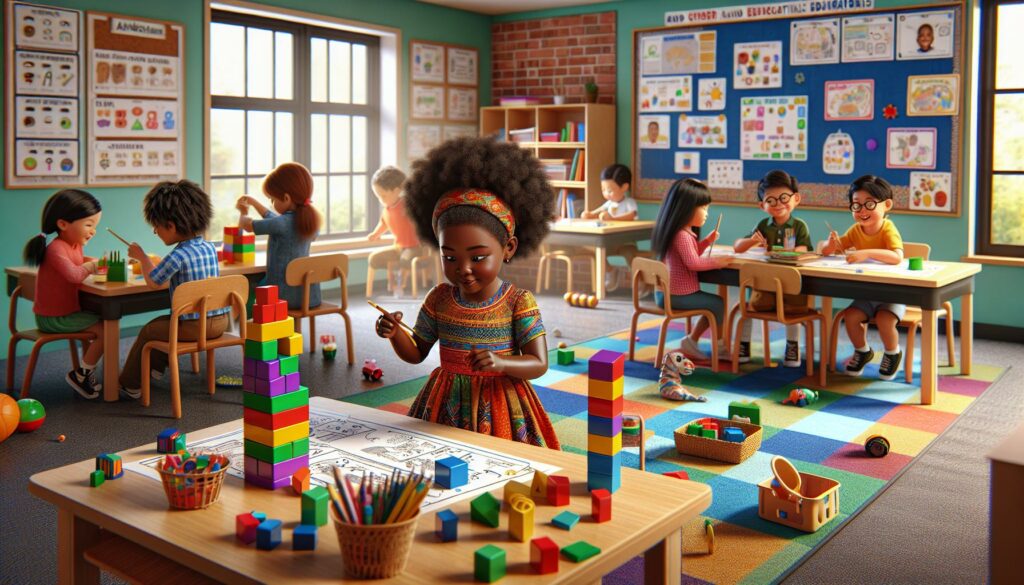Early childhood education is evolving rapidly, and it’s exciting to witness the trends shaping how our youngest learners experience the world. As I delve into this topic, I see a growing emphasis on play-based learning, social-emotional development, and technology integration. These shifts not only enhance the educational landscape but also prepare children for a future that demands adaptability and creativity.
With an increasing focus on holistic approaches, educators are recognizing the importance of nurturing the whole child. This means fostering not just academic skills but also emotional intelligence and resilience. In this article, I’ll explore the latest trends in early childhood education, highlighting how these changes are making a lasting impact on our children and the educators guiding them. Join me as we uncover the innovative practices that are setting the stage for a brighter future in early learning.
Key Takeaways
- Play-Based Learning: Emphasizes exploration and creativity, fostering children’s natural curiosity and enhancing cognitive development through hands-on experiences.
- Social-Emotional Development: Increasingly recognized as vital; curricula now focus on nurturing resilience, empathy, and effective communication skills among young learners.
- Technology Integration: Incorporates digital tools and resources, facilitating personalized learning experiences while encouraging early digital literacy and engagement.
- Culturally Responsive Teaching: Highlights the importance of inclusivity and respect for diverse backgrounds, helping children feel acknowledged and connected in learning environments.
- Holistic Approaches: Focus on nurturing the whole child by balancing academic and emotional growth, which is essential for well-rounded development.
- Equity and Access: Addressing disparities in access to quality early education remains a priority, requiring community support and targeted initiatives to ensure inclusivity for all children.
Trends In Early Childhood Education
Emerging trends in early childhood education reflect a commitment to developing well-rounded individuals. Play-based learning emphasizes exploration and creativity, fostering children’s natural curiosity. Educational settings incorporate engaging activities that spark imagination and enhance problem-solving skills.
Social-emotional development gains recognition as a vital component of learning. Curricula increasingly focus on fostering resilience, empathy, and collaboration among children. Programs emphasize communication skills, enabling children to express feelings and resolve conflicts effectively.
Technology integration remains a significant trend, enhancing educational experiences. Many classrooms incorporate tablets and interactive tools, facilitating personalized learning and expanding access to resources. Educators use digital platforms to engage children and connect with families.
Culturally responsive teaching also gains traction, recognizing the diverse backgrounds of students. This approach values inclusivity and reflects children’s lived experiences, helping them feel seen and heard in their learning environments. Schools implement practices that honor various cultural perspectives and traditions.
A holistic approach nurtures the whole child, balancing academic and emotional development. Early childhood educators recognize that fostering a supportive environment promotes connection and well-being. By intertwining these trends, early childhood education evolves, shaping future generations.
Importance Of Early Childhood Education
Early childhood education plays a crucial role in shaping children’s development and preparing them for future success. By fostering essential skills during these formative years, early education influences individuals, families, and communities.
Impact On Child Development
Child development greatly benefits from early childhood education. Investment in quality programs enhances cognitive abilities, language skills, and social interactions. Research indicates that children who participate in structured educational environments exhibit improved academic performance as they progress through school. They develop critical thinking skills and resilience, which assist in navigating challenges. Furthermore, early education encourages positive relationships with peers and adults, laying the foundation for strong emotional intelligence.
Benefits For Families And Communities
Early childhood education extends its advantages beyond individual children, positively impacting families and communities. Families experience smoother transitions into school systems when children have access to early education. This early preparation can lead to reduced stress for parents and increased confidence in managing school-related tasks. Communities benefit through the collective growth of educated individuals, resulting in enhanced social cohesion and economic development. Programs that promote family engagement also strengthen community ties, fostering a collaborative environment for nurturing future generations.
Current Trends Shaping Early Childhood Education
Emerging trends significantly influence early childhood education, focusing on holistic methods that nurture children’s overall development.
Emphasis On Play-Based Learning
Play-based learning remains central to early childhood education. I see how engaging children in playful activities fosters exploration, creativity, and critical thinking. This method cultivates problem-solving skills through hands-on experiences. Research indicates that children who participate in play-based learning experience enhanced cognitive development and greater academic success. Curricula now incorporate structured play opportunities, allowing children to interact and collaborate, further developing social skills.
Integration Of Technology In The Classroom
Integrating technology in the classroom transforms early childhood education. It provides personalized learning experiences tailored to individual children’s needs. Interactive tools, such as tablets and educational software, enhance engagement and encourage digital literacy from a young age. I find that technology also allows for diverse learning materials, catering to various learning styles. Studies show that when used effectively, technology enhances learning outcomes without replacing fundamental face-to-face interactions.
Focus On Social-Emotional Learning
Social-emotional learning (SEL) has gained prominence in early childhood education. I recognize its role in developing resilience, empathy, and communication skills. Curricula are increasingly incorporating SEL programs that teach children to manage emotions and build relationships. Research indicates that a strong emphasis on SEL contributes to better academic performance and positive behavior in the classroom. By integrating these skills, educators prepare children for future social interactions and challenges, fostering a supportive learning environment.
Challenges And Considerations
Early childhood education faces significant challenges that can impact its effectiveness. Addressing these challenges is crucial for maximizing the benefits of emerging trends.
Equity And Access Issues
Equity and access remain significant concerns within early childhood education. Many children from underserved communities lack access to quality educational programs, hindering their development and future success. Disparities often arise due to socioeconomic factors, geographical barriers, and varying levels of parental involvement. Ensuring that all children enjoy equal access to early learning opportunities requires targeted initiatives, policy changes, and community support. Organizations like the National Association for the Education of Young Children (NAEYC) advocate for equitable policies that enhance access for marginalized families.
Strain On Resources And Funding
Strain on resources and funding presents another challenge in early childhood education. Many programs operate with limited budgets, affecting staffing, materials, and facility quality. Funding inconsistencies can lead to staffing shortages, increased teacher-to-student ratios, and inadequate training opportunities for educators. Addressing these issues demands public and private investments, comprehensive funding strategies, and community partnerships that prioritize early childhood education. Solutions must include advocating for increased public funding and exploring innovative financing models that sustain high-quality early learning environments.
Future Directions In Early Childhood Education
Future directions in early childhood education signify a commitment to innovative practices that cater to the diverse needs of children. Focus areas include individualized learning plans, social-emotional development, and technology integration.
- Individualized Learning Plans: Individualized learning plans enhance educational experiences by tailoring instruction to meet children’s unique strengths and needs. Differentiated approaches allow for diverse learning styles, ensuring every child receives appropriate support throughout their development.
- Social-Emotional Learning (SEL): SEL will continue to gain momentum, targeting the development of resilience, empathy, and emotional regulation skills. Programs integrating SEL into curricula contribute to creating a positive classroom environment and boosting children’s overall academic and emotional wellness.
- Technology Integration: Technology’s role expands, enhancing early childhood education through interactive platforms and resources. Digital tools, such as educational apps and online resources, support personalized learning, while virtual reality experiences foster creativity and exploration.
- Culturally Responsive Practices: As diversity in classrooms increases, culturally responsive practices become essential. Educators emphasize inclusive learning environments, incorporating various cultural perspectives and fostering respect and understanding among peers.
- Family Engagement: Engaging families strengthens connections, creating supportive networks that enhance children’s learning experiences. Collaborating with parents fosters holistic development and encourages ongoing communication about children’s progress and needs.
- Equity in Access: Addressing inequities in access to quality education remains a priority. Community partnerships and advocacy for policy changes are crucial to ensure all children, regardless of their backgrounds, have access to early learning opportunities.
- Teacher Training and Development: Investing in professional development for educators ensures they stay current with best practices and innovative strategies. Continuous training enhances teaching effectiveness, directly impacting children’s learning outcomes.
By focusing on these directions, early childhood education can adapt to the evolving needs of children, equipping them with essential skills for success in future academic and social pursuits.
Individualized Learning Plans
The trends in early childhood education are shaping a brighter future for our youngest learners. By embracing play-based learning and focusing on social-emotional development, we’re not just teaching academic skills but nurturing well-rounded individuals.
Technology integration and culturally responsive teaching are essential in creating inclusive environments that honor every child’s background. As I reflect on these trends, it’s clear that addressing access and equity challenges is crucial.
Investing in quality early education can transform lives and communities. By prioritizing these innovative practices, we can ensure that every child is equipped with the skills they need to thrive in an ever-changing world.

